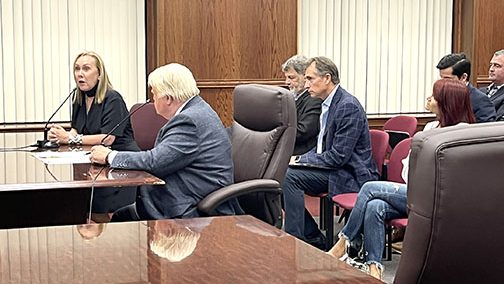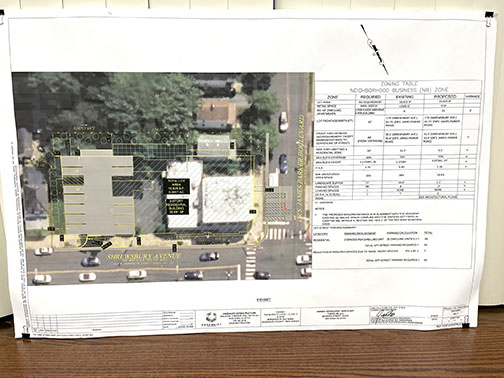
Karen Fluharty, left, co-developer of Thrive RB LLC and founder of Parents With a Plan, told the Red Bank Zoning Board the proposed project will serve as a model for other communities. Sunayana Prabhu
By Sunayana Prabhu
RED BANK – The borough’s zoning board of adjustment approved a residential building for adults with intellectual/developmental disabilities, the first of its kind in New Jersey. The proposed building will replace an existing two-story building with a three-story apartment complex with support services at 273 Shrewsbury Ave. at the intersection of Drs. James Parker Boulevard.
Hailed as a “game-changing” and “historic” project by many during the Sept. 7 zoning board meeting, the application, led by nonprofit Thrive RB, LLC, and backed by Parents With A Plan, is the first model in the state to provide independent housing options for neurodiverse individuals.
The application won approval with little resistance from the public or zoning board members. The building will include 32 units – one-bedroom units for residents and one ground-floor apartment for a staff member who will provide 24/7 support services. The 35,891-square-foot residential building will have 13 parking spaces for building employees and visitors. The site plans also include landscaping, a patio and onsite amenities related to the residents’ life skills development.
Edward W. O’Neill Jr., a licensed professional planner, said in his testimony on behalf of Thrive RB that the project has an “inherently beneficial use,” a term codified in the state’s municipal land use law and defined in the New Jersey Zoning Land Use Administration book as a use “universally considered of value to the community because it fundamentally serves the public good and promotes the general welfare.” Such uses could include a hospital, a school, a childcare center, a group home or a clean energy facility.

O’Neill cited various reasons why the location is “extremely appropriate” for the proposed use. Not only does the site have easy access to mass transportation, there is a bus stop in front of the building with direct access to Brookdale Community College for educational opportunities. The YMCA is only a few blocks away and the area offers job opportunities both on Shrewsbury Avenue and in the greater Red Bank area. The proposed site has public park space across the street, is close to shops and services, and is near numerous places of worship.
“All of these facilities together make this a really ideal location for persons with these disabilities to become active members of our community,” said O’Neill.
O’Neill noted that New Jersey currently has one of the highest rates of autism in the United States, with 1 in 35 people impacted. And once a neurodiverse individual becomes an adult, “most of their public services go away,” O’Neill said.
“These persons must be provided with safe, appropriate, cognitively accessible housing.”
Without facilities and resources, neurodiverse individuals risk involuntary displacement, institutionalization or homelessness.
O’Neill said the project won’t negatively impact the borough’s economy or the state.
Thrive is a privately funded project with several limited partnerships, including those organizations interested in achieving social impact. “This will create a model for other projects like this, not just in New Jersey, but throughout the U.S.A.,” said John Klein, co-developer of Thrive. He said five apartments in the building will be set aside as affordable housing units.
According to the developers, Thrive RB was inspired by First Place AZ, a neurodiverse housing community in Phoenix, Arizona. Zoning board member Paul Cagno cast the sole dissenting vote, voicing several concerns about traffic. He questioned whether the development is modeled after the Phoenix, Arizona community. Klein said there are a few similarities, however this is a smaller project and does not offer a transition academy.
Board member Sharon Lee asked whether this “pilot program” was equipped to meet the needs of its residents. Karen Fluharty, Rumson-based co-developer of Thrive RB LLC, founder of Parents With A Plan and mother of an adult son with autism, said, “The building is adequate for what we want to do on this pilot and for our first project.”
Residents will have access to a teaching kitchen, a health and wellness area, game rooms, a multipurpose room and other amenities. “The footprint of the building is adequate to execute all of those” features, said Fluharty.
“Our goal is to serve Monmouth County,” she added. “It is our hope that this serves as a model that we can bring to other communities or potentially expand here in Red Bank.”
Fluharty explained that the project will be in a public-private partnership with the Rutgers Center for Adult Autism Services (RCAAS) to provide neurodiverse supportive housing using expertise of Rutgers senior clinical faculty and staff while also providing opportunities for university students from a variety of academic disciplines to receive hands-on training and intensive super vision.
“Please pass this law,” Katie Cartier, a young, neurodiverse woman, implored the board.
“If I live here, I can walk to Count Basie and shop at Foodtown,” she said.
“When I was a student at George Mason University, I worked two jobs. Now, I want to live independently. Please allow me to have the chance.”
Many parents of neurodiverse children spoke during the meeting about being concerned for their children’s future and amplified the need to encourage their independence.
“My deepest fear is who is going to not only take care of my son when I’m no longer here but who’s going to care about him,” said Red Bank resident Jane Kleiman.
Funding from the federal and state government “is designed to put people into group homes of three or four people that they don’t know, in some random suburban neighborhood, with people who get paid $17 an hour,” Kleiman said. “If that’s not institutional, I don’t know what it is.”
Mark Cartier, founder of No Limits Cafe in Middletown, championed his neurodiverse daughter, Katie, and the cause. He referred to the Americans with Disabilities Act of 1990, which promised equity of opportunity. But after 33 years, “look how far we haven’t come,” Cartier said.
“The opportunities for employment and the opportunities for housing are (still) so limited.”
Even after the Olmstead Decision of 1999 – often referred to as the “integration mandate” – people with disabilities continue to face challenges accessing employment, transportation and housing.
“The ability to take care of oneself should never be underestimated,” Mark Cartier told the board. “As a population, we’ve gone from institutionalization and institutionalizing individuals to a world where we’ve become much kinder.” The next step in the evolution is “empowerment,” he said.
Red Bank has a history of inclusive enterprises, including JBJ Soul Kitchen and Lunch Break, among others. Kevin Kennedy, the zoning board attorney, told the board the borough previously approved Lunch Break and the Parker Family Health Center as projects with “inherently beneficial use.”
The Thrive project received approval subject to a number of terms and conditions, including adherence to affordable housing norms, deed restrictions, the number of units, and other specifications.
The article originally appeared in the September 14 – 20, 2023 print edition of The Two River Times.














